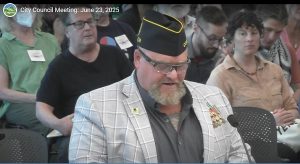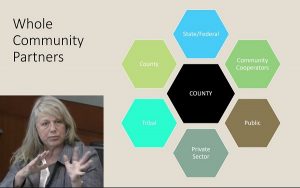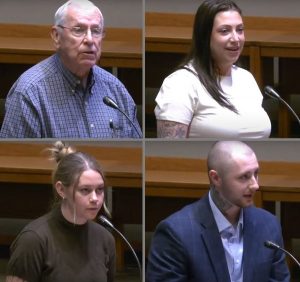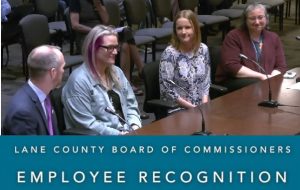DeFazio: 7 ways the Constitution blocks democracy
7 min read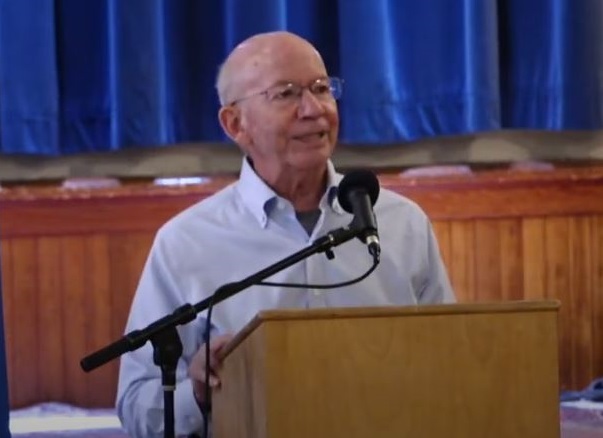
The U.S. Constitution is the root cause of many of our political problems today. For the City Club at the WOW Hall Sept. 6:
[00:00:10] Peter DeFazio (former U.S. representative, CD-4): It’s critical to look at the founding of the nation and the founding documents to find some of the problems that we have today.
[00:00:19] We first had the Articles of Confederation. There was a lot of postwar turmoil with the debt and resentment about taxation, gold standard, and other things. One state could veto anything that the government wanted to do. So, you know, the founders thought, ‘This just isn’t working.’
[00:00:37] Now, there was one great example they could have adopted, which was the state of Pennsylvania. They had a unicameral legislature. They had one-year terms, seven-year term limits. They allowed people who didn’t own property to vote. And they also taxed property for public education.
[00:00:56] Well, that was not the model that our founders wanted. In fact, they really did not want something that was a real representative democracy. Alexander Hamilton and Elbridge Gerry feared an excess of democracy. They were heavily inspired by Montesquieu, who said there should be a separation of powers, and ‘It should be done to create competing entities so little will get done and create a stasis.’ Madison called him ‘The Oracle.’ And so basically, that was the inspiration for the founding of our country.
[00:01:32] You know, they divided us, you know, we’re going to have a House and a Senate with different modes and times of election. In the House, each state’s number of seats would be in proportion of population, including a three-fifths count for each slave to further placate the slave states. And, of course, in the Senate, they all had the same number of seats, and they were appointed by the states until 1913 with the 17th Amendment.
[00:01:59] Madison feared without these compromises, they wouldn’t have been able to get the Constitution done, and he’s probably right, but these are fatal flaws… These are the seven filters they put in place to really avoid an excess of democracy:
[00:02:13] Bicameral legislature (House, Senate), Electoral College, Supreme Court, presidential veto power, and then they delegated to the states that they could create their own process for government, which led to large gerrymandering problems.
[00:02:27] Scholars say it is the most difficult constitution in the world to amend—(it) requires three-quarters of the House, two-thirds of the Senate, and three-quarters of the states to amend.
[00:02:37] So the seeds of dysfunction were planted right there at the beginning, and now they’ve evolved.
[00:02:42] Gerrymandering, you know, took hold in a big way, and the Supreme Court ruled also that the redistricting was not tied to the decennial census, which is pretty clear to me, that’s what the founders—but, you know, these are originalists. So they said for the first time you can redistrict whenever you wanted. If you take over a majority, you can redistrict.
[00:03:08] John Q: Mary Leighton agreed that gerrymandering is an issue in both major parties.
[00:03:12] Mary Leighton (City Club member): Mary Leighton, City Club member. So I want to talk more about gerrymandering. A few years ago, in return for his service as an independent thinker who belonged to the Democratic Party, Marty Wilde got gerrymandered out of his district. And it was shaped in a way that only a Republican could win…. What’s the point in running as a Democrat in this new, what is it, District 11 or District 12, whatever it is now? Is there any solution that Democrats might embrace and promote that would fix this problem?
[00:03:45] Peter DeFazio: We can fix gerrymandering. We can’t impose anything on the states internally for their own elections, but for federal elections I was on a bill when I left that would mandate independent commissions in all the states, and then have standards in place. California is a very good example of a good commission. It is truly independent.
[00:04:08] Congress could also mandate proportional voting, similar to what many in our peer democracies have, where they have proportional multi-member districts.
[00:04:18] You could increase the size of the House, hasn’t been increased since 1915, and in terms of the House, there are some who say that term limits is a solution. Term limits is not the solution.
[00:04:28] John Q: Peter DeFazio spoke at length about several of the seven filters. Here’s more detail about the Electoral College:
[00:04:34] Peter DeFazio: Then we go to the Electoral College. (They) had a very long debate during the convention about that. And Madison knew that, again, the south, the slave states, would not abide by a popular vote. And so therefore, we ended up with the Electoral College. The founders, you know, we didn’t have parties at that point in time, and they thought that the electors would have individual discretion.
[00:05:01] Unfortunately at this point, we’ve moved to a point where every state except for two assigns all of their electors to the winner of the vote in that state. There is no discretion. Only Nebraska (one district) and Maine (one district), they do the electoral vote by district, and in Nebraska, they tried to overturn that because they’re afraid they’re going to lose that seat. They failed in their legislative effort at that point in time.
[00:05:36] But, so there’ll be tens of millions of dollars spent in one district in Maine, in one district in Nebraska to try and get that one could-be-pivotal Electoral College vote.
[00:05:49] You know, if the Electoral College fails to meet or doesn’t come to a conclusion, then we go to the states. A lot of people don’t know that. And every state gets one vote. And in fact, Donald Trump talked about this in Pittsburgh in September of 2020. And he went on in his way saying, ‘You know, if the Electoral College doesn’t meet or they don’t come to conclusion, I’m president. I’m president.’ And I think that was basically behind the whole thing of Jan. 6 and the idea if they could stop the Electoral College, he would be president.
[00:06:22] We have a primitive system. The way the authority was given, they were proposing that the vice president could ignore or change the results. Luckily, (Vice President) Pence had the integrity to say, ‘No, I can’t do that.’
[00:06:38] But if they had gotten a hold of those ballot boxes, which had envelopes in them that were sent by the states, they would have had to go back to the states to recertify the election by the deadline, that is, by the 16th of January. And by then, we had three or four states off the rails—Arizona, Georgia, and others saying they wouldn’t have recertified. Then it would have gone to the House, and he still would have been president.
[00:07:02] We didn’t fix that, but we did make clear that there is no discretion, that whatever is submitted by the states is binding.
[00:07:09] Then we come to the Supreme Court. Again, one of the seven filters they put in place. In 1803, the court actually arrogated to itself the authority to overrule laws passed by Congress. That wasn’t in the Constitution. They just said, we have this power. And that was Marbury v. Madison. The Supreme Court does not inherently, in the Constitution, have the power to overrule Congress, like they’re doing consistently. That could be changed. So Congress could limit their jurisdiction.
[00:07:43] John Q: Article V provides two ways to amend the constitution, and one of the two ways has never been tried.
[00:07:51] Peter DeFazio: In fact, there are people who are actually proposing a constitutional convention to impose term limits on Congress. And besides that, you can’t control a constitutional convention. Everything is on the table. This is agreed to by almost all scholars if you have a constitutional convention. That means the Bill of Rights and any other section of the Constitution that this group happens to disagree with.
[00:08:17] A very, very dangerous and stupid idea, and hopefully the Oregon Legislature won’t bite on the bait. Quite a few have, and we’re pretty close to having a constitutional convention, but a constitution convention is a very, very bad idea.
[00:08:31] But these are the looming threats that are inherent in the founding documents of this country that are a problem.
[00:08:40] John Q: He said he first gave the speech at Oxford University after being invited by UO professor Cheyney Ryan.
[00:08:48] Peter DeFazio: This speech, I first gave a version of the speech in 2010 at Merton College. There was a professor at the U of O, some of you knew him, Cheyney. And he invited me over to give a speech and I said, ‘What do you want me to talk about?’ He said, ‘Talk about the future of American democracy.’
[00:09:04] So that was the first time I gave the speech. It was ‘America’s representative democracy cannot survive’ and I guess the students, the Brits, everyone that was there was shocked. At that point I was talking about (the Supreme Court decision) Citizens United and some other things.
[00:09:19] Since then I’ve given the speech a number of times and most recently a more academic version of it at the U of O in March.
[00:09:27] John Q: Rep. DeFazio was welcomed to the WOW Hall by Thomas Hiura.
[00:09:31] Thomas Hiura (WOW Hall): We are so pleased that the City Club has chosen to meet here at the historic WOW Hall. We are an all-ages performing arts venue and a nonprofit volunteer- and staff-run organization. 2025 marks our 50th anniversary, and we couldn’t be more pleased to further our civic engagement efforts by welcoming the City Club to the WOW Hall.
[00:09:51] We invite folks to become a WOW Hall volunteer, see a show, attend a class, become a sustaining member, have a community gathering, or rent the WOW Hall for a private event.
[00:10:00] John Q: At the end of the program, the WOW Hall crowd showed its appreciation for Peter DeFazio.
[00:10:06] Peter DeFazio: Thanks very much. I appreciate you all being here. (Applause)
